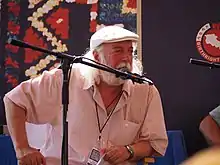Levon Abrahamian
Levon H. Abrahamian (Armenian: Լևոն Աբրահամյան; born January 2, 1947)[1] is an Armenian anthropologist and historian.

Biography and career
Abrahamian was born in Yerevan, Soviet Armenia on January 2, 1947.[1] He graduated from Yerevan State University (YSU) with M.S. in biophysics in 1970[1][2] and from the Institute of Anthropology and Ethnography of the Soviet Academy of Sciences in 1978 as Candidate of Sciences in Cultural and Social Anthropology.[2] He joined the Institute of Archaeology and Ethnography at the Academy of Sciences of Soviet Armenia in 1978,[3] initially working as a junior researcher until 1988 and then as senior researcher.[1] In 2005 he headed the Institute's Department of Contemporary Anthropological Studies.[1][3]
Abrahamian has taught at YSU since 1990.[4][2] He has also taught as a visiting professor at the University of Pittsburgh (1994), Columbia University (2001), University of California, Los Angeles (2008), and University of California, Berkeley (1997 and 2015).[2]
In November 2018 Abrahamian was elected president of the Board of Trustees of the Matenadaran.[2][5]
Recognition
Abrahamian is a corresponding member of the National Academy of Sciences of Armenia (2006).[1][2] In 2009 Armenian President Serzh Sargsyan awarded him the title of an Honored Worker of Culture.[2][6]
Research and publications
Abrahamian's anthropological research focuses on ancient and modern Armenia and Armenians, including Armenian identity, comparative mythology, rituals, urban anthropology and the cultures of Australia and Oceania.[1][2] He has authored five books and numerous papers.[2]
His two English-language books, Armenian Folk Arts, Culture, and Identity (2001)[7][8][9] and Armenian Identity in a Changing World (2006)[10] received positive reviews.
Books
- Abrahamian, Levon. Primitive Festival and Mythology (1983). Yerevan: Academy of Sciences of Armenian SSR Press (in Russian)
- Abrahamian, Levon, and Nancy Sweezy, eds. Armenian Folk Arts, Culture, and Identity (2001). Indiana University Press
- Conversations Near a Tree. Moscow: Languages of Slavonic Cultures, 2005, in Russian
- Abrahamian, Levon. Armenian Identity in a Changing World (2006). Mazda Publishers ISBN 1-56859-185-3
- Kharatyan, Hranush; Shagoyan, Gayane; Marutyan, Harutyun; Abrahamian, Levon. Stalinist Repressions in Armenia: History, Memory [Ստալինյան բռնաճնշումները Հայաստանում. պատմություն, հիշողություն, առօրյա] (2015). "Gitutyun" Publishing of the National Academy of Sciences of Armenia (in Armenian)
Articles
- "On Schneider's Symbolic Culture Theory", Current Anthropology, Vol. 21, No. 2 (Apr., 1980), pp. 255–256
- "The secret police as a secret society: fear and faith in the USSR" Russian Social Science Review 35, no. 3 (1994), pp. 81–95.
- "Typology of Aggressiveness and National Violence in the Former USSR", International Journal on Minority and Group Rights, Vol. 4, No. 3/4, (1996/97), pp. 263–278
- "Lenin as a trickster" Anthropology & archeology of Eurasia 38, no. 2 (1999), pp. 8–26.
- "The Chained Hero: The Cave and the Labyrinth", Iran & the Caucasus, Vol. 11, No. 1 (2007), pp. 89–99
- "From Carnival Civil Society Toward a Real Civil Society: Democracy Trends in Post-Soviet Armenia" Anthropology & archeology of Eurasia 50, no. 3 (2012): pp. 11–50.
- "Velvet Revolution, Armenian Style", Demokratizatsiya, vol. 26, n. 4, Fall 2018
References
- "Աբրահամյան Լևոն Հմայակի [Levon H. Abrahamyan]". sci.am (in Armenian). National Academy of Sciences of Armenia. Archived from the original on 21 May 2020.
- "Levon Abrahamian" (PDF). Insitute of History, National Academy of Sciences of Armenia. Archived from the original (PDF) on 21 May 2020.
- "Levon Abrahamian". Institute of Archaeology and Ethnography, National Academy of Sciences of Armenia. Archived from the original on 21 May 2020.
- "Levon H. Abrahamyan". ysu.am. Yerevan State University. Archived from the original on 21 May 2020.
- "Matenadaran Foundation has new president of board of trustees". Armenpress. 6 November 2018. Archived from the original on 21 May 2020.
- "Decrees of the President of RA". president.am (in Armenian). 26 May 2009. Archived from the original on 21 May 2020.
Մշակույթի վաստակավոր գործչի` Լեւոն Հմայակի ԱԲՐԱՀԱՄՅԱՆԻՆ ազգագրագետ, ՀՀ ԳԱԱ հնագիտության եւ ազգագրության ինստիտուտի արդի ազգաբանության բաժնի վարիչ
- Astourian, Stephan (Spring 2002). "Reviewed Work: Armenian Folk Arts, Culture, and Identity by Levon Abrahamian, Nancy Sweezy, Sam Sweezy". Traditional Dwellings and Settlements Review. 13 (2): 75–76. JSTOR 41757899.
This beautifully produced volume broadens significantly the scope of Armenology in the West, all too often preoccu- pied only with medieval literary, theological, and historical texts, and with the issue of Greek or Persian influence. It will be of interest to Indo-Europeanists, students of the Caucasus, anthropologists, and all those interested in tradi- tional cultures and environments.
- Firkatian, Mari A. (January 2003). "Reviewed Work: Armenian Folk Arts, Culture, and Identity by Levon Abrahamian, Nancy Sweezy". The Russian Review. 62 (1): 150. JSTOR 3664563.
...tographer, the book is extremely accessible to Western readers yet would satisfy Armenians as well.
- Birkalan, Hande A. (Spring 2004). "Reviewed Work: Armenian FolkArts, Culture, and Identity by Levon Abrahamian, Nancy Sweezy". The Journal of American Folklore. 117 (464): 202–203. doi:10.1353/jaf.2004.0029. JSTOR 4137827.
Nevertheless, the jargon-free language, style, and conceptual organization of Abrahamian and Sweezy's book make it an important contribution to the study of art, culture, and history, and it establishes a good dialogue with its readers. Especially for those who are interested in a general knowledge of the Armenian people, this book is certain to become an important source.
- Kotchikian, Asbed (May 2008). "Reviewed Work: Armenian Identity in a Changing World by Levon Abrahamian". International Journal of Middle East Studies. 40 (2): 315–316. doi:10.1017/S0020743808080562. JSTOR 30069615.
This book is strongly recommended to anyone dealing with issues of changing identity in the post-Soviet space. The simple language of the author makes his research accessible to nonacademics and experts alike and gives the reader a chance to explore the process of post-Soviet transition. Overall, this is a great book that also lays the groundwork for further research on a little explored topic.